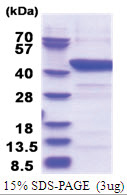IDO1 / INDO (1-403, His-tag) Human Protein
Other products for "IDO1"
Specifications
| Product Data | |
| Species | Human |
| Expression Host | E. coli |
| Expression cDNA Clone or AA Sequence |
MGSSHHHHHH SSGLVPRGSH MGSMAHAMEN SWTISKEYHI DEEVGFALPN PQENLPDFYN DWMFIAKHLP DLIESGQLRE RVEKLNMLSI DHLTDHKSQR LARLVLGCIT MAYVWGKGHG DVRKVLPRNI AVPYCQLSKK LELPPILVYA DCVLANWKKK DPNKPLTYEN MDVLFSFRDG DCSKGFFLVS LLVEIAAASA IKVIPTVFKA MQMQERDTLL KALLEIASCL EKALQVFHQI HDHVNPKAFF SVLRIYLSGW KGNPQLSDGL VYEGFWEDPK EFAGGSAGQS SVFQCFDVLL GIQQTAGGGH AAQFLQDMRR YMPPAHRNFL CSLESNPSVR EFVLSKGDAG LREAYDACVK ALVSLRSYHL QIVTKYILIP ASQQPKENKT SEDPSKLEAK GTGGTDLMNF LKTVRSTTEK SLLKEG
|
| Tag | His-tag |
| Predicted MW | 47.7 kDa |
| Concentration | lot specific |
| Purity | >90% by SDS - PAGE |
| Buffer | Presentation State: Purified State: Liquid purified protein Buffer System: 20 mM Tris-HCl buffer (pH 8.0) containing 0.15M NaCl, 20% glycerol, 1mM DTT |
| Preparation | Liquid purified protein |
| Protein Description | Recombinant human IDO1 protein, fused to His-tag at N-terminus, was expressed in E.coli and purified by using conventional chromatography techniques. |
| Storage | Store undiluted at 2-8°C for one week or (in aliquots) at -20°C to -80°C for longer. Avoid repeated freezing and thawing. |
| Stability | Shelf life: one year from despatch. |
| Reference Data | |
| RefSeq | NP_002155 |
| Locus ID | 3620 |
| UniProt ID | P14902, A0A348GSI3 |
| Cytogenetics | 8p11.21 |
| Synonyms | IDO; IDO-1; INDO |
| Summary | 'This gene encodes indoleamine 2,3-dioxygenase (IDO) - a heme enzyme that catalyzes the first and rate-limiting step in tryptophan catabolism to N-formyl-kynurenine. This enzyme acts on multiple tryptophan substrates including D-tryptophan, L-tryptophan, 5-hydroxy-tryptophan, tryptamine, and serotonin. This enzyme is thought to play a role in a variety of pathophysiological processes such as antimicrobial and antitumor defense, neuropathology, immunoregulation, and antioxidant activity. Through its expression in dendritic cells, monocytes, and macrophages this enzyme modulates T-cell behavior by its peri-cellular catabolization of the essential amino acid tryptophan.[provided by RefSeq, Feb 2011]' |
| Protein Families | Druggable Genome |
| Protein Pathways | Metabolic pathways, Tryptophan metabolism |
Documents
| FAQs |
Resources
Recombinant Protein Resources |
{0} Product Review(s)
0 Product Review(s)
Submit review
Be the first one to submit a review
Product Citations
*Delivery time may vary from web posted schedule. Occasional delays may occur due to unforeseen
complexities in the preparation of your product. International customers may expect an additional 1-2 weeks
in shipping.






























































































































































































































































 Germany
Germany
 Japan
Japan
 United Kingdom
United Kingdom
 China
China
